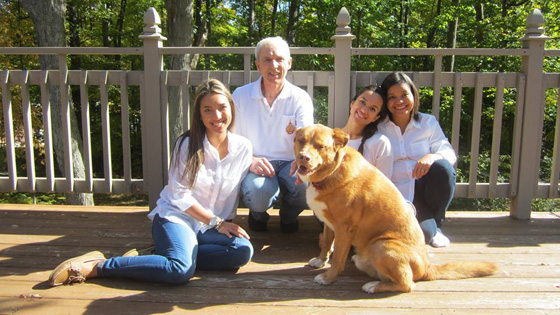
Steven Burns, second from left, at home with his family. Burns was cured of Hepatitis C after living with the virus for more than 40 years. (Photo: Burns Family).
Having lived with the hepatitis C virus for more than 40 years, Steve Burns of Orillia, Ontario was ready to give up on the thought that he would ever be cured.
In his early 40s, Burns and his brother – who had bought the family business from their father years earlier – decided to apply for partnership insurance to cover any incidentals. After a routine blood test that was a requirement for the application, Burns learned he had "irregularities in his blood" and was referred to the Toronto Western Hospital's (TWH) Francis Family Liver Clinic.
It was there that he learned he had hepatitis C which had gone undiagnosed since his late teens.
"It was a shock," Burns recalls. "I felt healthy enough and didn't have any symptoms, but it just goes to show you don't always know what's going on inside your body."
Related to this story:
Burns was diagnosed in the early days of the virus, only a few years after it had been discovered. "They had only recently started calling it hepatitis C," he says. "So there was little they could offer me for treatment."
Hepatitis is a liver disease caused by the hepatitis C virus. Some people who become infected with the virus never feel sick and recover completely, but others are unable to fight off the virus and develop chronic hepatitis. Chronic hepatitis can lead to cirrhosis (scarring of the liver), liver failure and even liver cancer later in life. There are approximately 252,000 Canadians living with the disease.
Nothing worked
Burns was monitored regularly, travelling to TWH every year for check-ups. As researchers learned more about hepatitis C, there were opportunities for him to enrol in clinical trials to test different treatments for the virus.
In the 20 years since his diagnosis, Burns enrolled in three different drug trials. Each one required either injections of a drug or a combination of injection and a pill, as well as weekly follow up appointments over several months. Some of the treatments also had serious side effects.
None of them worked.
"It was very hard to get my hopes up each time only to find that the treatment failed," says Burns. "I knew that by participating in these trials I was at least helping researchers and giving them the knowledge they needed to learn more about how to treat the virus, but I was really hoping one of them would work for me."
It had been about nine years since Burns last enrolled in a trial. Although there were now a few promising hepatitis C treatments on the market, Burns' specialist, Dr. David Wong, said that because Burns had been living with the virus for so long, it would take a new drug to overcome the tolerance his body had built up.
"I tried not to worry because I wasn't feeling sick and I could still work and enjoy my life," says Burns. "But a few close friends who'd also had hepatitis C had recently died from liver disease or liver cancer caused by the virus. It was hard to lose them and also know that could happen to me."
New hope
In 2014, something new finally came along. Burns was enrolled in a trial to test sofosbuvir-velpatasvir, a pill taken daily that was showing promise not only against all types of hepatitis C, but also for those who'd been living with the virus for a long time.
Burns began to take his daily pill for the required three months and, as before, travelled to TWH for follow up appointments with research coordinator Camelia Capraru, to monitor his progress and measure the virus levels in his blood. Within a few weeks, tests of his liver function showed that everything had returned to normal. Burns was cautiously optimistic.
"I didn't want to get too excited because I'd already tried three treatments that failed," he said. "But every week, as Camelia got more excited by my results, so did I."
After the 12-week treatment, Burns had to wait another three months to see if the drug had successfully eliminated hepatitis C from his body.
Finally, after more than 40 years of living with the virus, Burns got some good news: he was cured.
"It was such a relief," says Burns a few months after receiving the all clear. "My body has been fighting this disease for so long I was so thankful to be rid of it. My only wish is this had come in time to help my friends."
A
study based on the trial that Burns participated in was published earlier this month showing this drug treatment to be effective in treating all types of hepatitis C within 12 weeks and curing 99 per cent of the participants.
"Throughout all these trials, the staff at the Francis Family Liver Clinic were so helpful and encouraging," says Burns. "I'm so grateful for their support over the years."
Burns, who now works part time at the family business, is happy to close the chapter of his life that included living with hepatitis C.
"I'll still be working to stay active and keep healthy, but I'm so much happier doing it without the virus."
